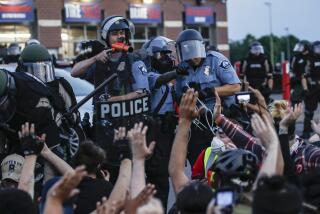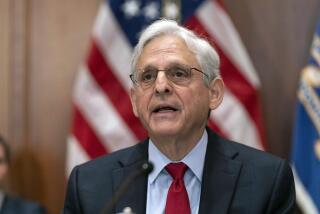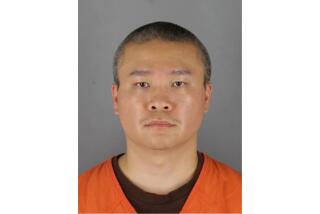New charges against former Minneapolis police officers detail George Floyd’s last moments

Fired officer Derek Chauvin is now facing second-degree murder charges in George Floyd’s death, and three other ex-officers are charged with “aiding and abetting” second-degree murder.
- Share via
MINNEAPOLIS — George Floyd told the four Minneapolis police officers, “I’m about to die.”
“You are talking fine,” an officer responded.
In the final 20 minutes of Floyd’s life, one officer pulled a gun on him as he pleaded with officers not to put him in the back seat because he was claustrophobic, according to charging documents filed Wednesday by state prosecutors. Following reports that a man had used a counterfeit $20 bill, the officers had pulled Floyd out of his car.
Later, another officer expressed concern, asking whether they should roll Floyd on his side.
Officer Derek Chauvin, who was recorded on video kneeling on Floyd’s neck as he begged for air before he died, replied, “No, staying put where we got him.”
Now, the three other Minneapolis police officers at the scene of Floyd’s death will face charges of aiding and abetting second-degree murder, the Minnesota attorney general announced Wednesday.
State Atty. Gen. Keith Ellison also elevated charges against Chauvin to second-degree murder.
Ellison said during a news conference Wednesday that he does not believe “one successful prosecution can rectify” the pain felt by the community.
“He should be here,” Ellison said of Floyd. “But he’s not.”
All four officers were fired shortly after Floyd’s death.
Arrest warrants were issued for the three other officers, Tou Thao, J. Alexander Kueng and Thomas Lane. Aiding and abetting second-degree murder is a felony under Minnesota state law.
Chauvin, who is being held at a state prison, was initially charged last week with third-degree murder and manslaughter before Minnesota Gov. Tim Walz asked Ellison to take over the prosecution.
Charges filed by the state and released Wednesday provide more detail into the incident and Floyd’s final moments.
Lane and Kueng arrived at the scene first, following the counterfeit bill reports. Lane walked to the driver’s side of Floyd’s car, where Floyd sat, and Kueng remained on the passenger’s side. A woman was in the passenger seat and another man sat in the back seat, the state’s charges say.
Lane pulled out his gun and pointed it at Floyd through an open window and told Floyd to show his hands. Floyd put them on the steering wheel. Lane pulled Floyd out of his car and handcuffed him.
Following instructions from Lane, Floyd sat down. Floyd then calmly said, “Thank you man.”
Kueng arrested Floyd on suspicion of passing counterfeit currency and tried to walk him into the police car. Floyd stiffened and fell to the ground, making clear he was not resisting but saying he didn’t want to get in the back seat because of his claustrophobia.
Chauvin and Thao soon arrived, and all four officers made “several attempts to get Floyd in the back seat of their squad car by pushing him.”
Chauvin pulled Floyd out of the squad car and Floyd went to the ground face-down, still handcuffed. Kueng held Floyd’s back while Lane held his hands. Chauvin’s knee pinned Floyd’s neck to the ground.
Floyd told them he could not breathe.
At one point, Lane told Chauvin, “I am worried about excited delirium or whatever.” But Lane made no move to reduce the force being used against Floyd, the complaint noted.
Nearly five minutes later, Kueng checked Floyd’s right hand for a pulse.
“I couldn’t find one,” Kueng said.
After eight minutes and 46 seconds, Chauvin removed his knee from Floyd’s neck. During the last two minutes and 56 seconds, Floyd was unresponsive.
The Hennepin County medical examiner’s autopsy concluded that Floyd died of “cardiopulmonary arrest complicating law enforcement subdual, restraint, and neck compression.” The autopsy ruled his death a homicide and noted that the presence of fentanyl contributed to Floyd’s death.
On Wednesday, the county released a fuller autopsy report noting that Floyd had also tested positive for COVID-19 but was most likely asymptomatic at the time of his death.
A separate autopsy commissioned by Floyd’s family found he died of asphyxiation due to neck and back compression.
All four officers face potentially decades in prison: The second-degree murder charge carries a maximum penalty of 40 years in prison, and charges of aiding and abetting carry the same maximum penalties as the underlying crime.
Ellison was frank about the case’s chances of success.
“Winning a conviction will be hard,” he said. “In fact, County Atty. [Michael] Freeman is the only prosecutor in the state of Minnesota that has successfully convicted a police officer for murder.”
Just before the charges were announced, Floyd’s son, Quincy Mason Floyd, visited the site where his father died, kneeling among the flowers and posters. As Floyd’s family began arriving in the city for his memorial Thursday, they called for action against the other officers to be taken before the event.
“We want justice,” said Floyd’s son, 27, who lives in Texas, standing before a large painted angel now marking the spot. “No man or woman should be without their fathers.”
The family’s attorney, Benjamin Crump, standing next to Quincy, said they expected the officers to be “charged as accomplices for the killing.” The Minneapolis police chief said that they were “complicit” and that audio and video from body cameras showed “they are also accomplices by their failure to act, when they knew he didn’t have a pulse,” according to Crump.
“We expected all of the police officers to be arrested before we have the memorial here in Minneapolis, Minnesota, tomorrow,” he said. “Because we cannot have two justice systems in America: one for black America, and one for white America.”
On Tuesday, Walz announced that the state’s Department of Human Rights will investigate the Minneapolis Police Department and had filed a “civil rights charge related to the death of George Floyd.“
The Police Department that same day released personnel records for Chauvin. The former officer, who had worked with the department since October 2001, had been disciplined for only one incident during his tenure, despite being the subject of at least 17 internal affairs investigations.
In that August 2017 incident in Longfellow, a neighborhood just south of downtown Minneapolis, Chauvin was accused of pulling a woman out of her car after stopping her for going 10 mph over the speed limit. The woman filed the complaint the next day.
According to internal records, Thao has been investigated at least six times by the department. None of those investigations resulted in discipline, records show. One case is pending.
The Minneapolis Police Department declined to confirm or comment on the additional charges against the fired officers.
Before being asked to lead the prosecution, Ellison, a former U.S. congressman for Minnesota, said of Floyd’s death: “George Floyd mattered.”
“Whenever someone dies at the hand of law enforcement or state power,” he continued in the statement, “we owe it to everyone affected to investigate thoroughly.”
On Wednesday, now charged with that investigation, Elliot said reform efforts should start immediately.
“We don’t need to wait for the resolution of this case to start that work,” he said. “We need citizens to begin rewriting the rules for a just society now. We need new policy and legislation and ways of thinking at the state and federal levels.”
Earlier at the memorial marking the spot where Floyd died, Suzie Hewitt, who grew up in the Twin Cities, kneeled as she and others in the crowd put their arms around her mother, who sobbed on the curb.
“All of those complaints against the officer,” Hewitt said, referring to Chauvin, “those were us, for years and years, and nothing got done.”
“All of this frustration, sadness, anger — this is what black trauma looks like,” said Hewitt, whose family is Eritrean. “I love Minnesota — it is my home … but now people are coming together to address this issue; it is no longer just ‘theirs.’”
More to Read
Get the L.A. Times Politics newsletter
Deeply reported insights into legislation, politics and policy from Sacramento, Washington and beyond. In your inbox twice per week.
You may occasionally receive promotional content from the Los Angeles Times.












